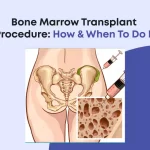
Enlarged Spleen Self-Test: What You Need To Know
Spleen! The name doesn’t ring a bell like the heart or lungs, but the little organ hidden in the left side of your stomach plays a vital role in your body’s functions. It plays a crucial role in filtering your blood, removing old or damaged red blood cells, and supporting your metabolism. When it enlarges, a condition called splenomegaly, can affect our body’s normal function. This organ is a key part of the immune system, providing resistance to infection.
If you’ve been experiencing unexplained symptoms or suspect that your spleen is dysfunctional. In that case, some simple home tests will give you a first impression, but before we dive into the self-assessment, let us understand the symptoms that may indicate an enlarged spleen.
Signs and Symptoms of Enlarged Spleen:
1. Fatigue and weakness:
Feeling more worn-out than usual, lacking energy, and experiencing weakness may be signs and symptoms that your spleen is probably enlarged. This occurs because an enlarged spleen can trap and store healthy red blood cells, leading to a decrease in blood count and inflicting fatigue.
2. Pain or discomfort in the left upper part of the abdomen:
Your spleen is located under your ribcage on the left side of your abdomen. If it becomes enlarged, it can cause pain or discomfort in this specific area. The pain might be sharp or dull, and can sometimes radiate to other nearby areas.
3. Frequent infections:
If you discover yourself catching infections more often, it may be a signal of a compromised immune system due to an enlarged spleen. The spleen performs a critical role in fighting off infections by generating immune cells known as lymphocytes. When it’s enlarged, its ability to combat infections can be affected.
4. Easy bleeding and bruising:
An enlarged spleen can affect your blood’s clotting potential, mainly to easy bruising or excessive bleeding from minor accidents. This occurs because the spleen helps in generating platelets, which can be crucial for blood clotting. When it’s enlarged, platelet production may be disrupted.
5. Feeling full without eating much:
If you often feel full and have lost the appetite, it is able to be the result of an enlarged spleen pressing against your stomach. This can create an experience of fullness even though you have not eaten much, mainly to reduce meal consumption.
6. Unexplained weight loss:
Sudden and unexplained weight loss can be related to an enlarged spleen. This can arise because of a disruption inside the regular metabolic approaches, wherein an enlarged spleen can affect the body’s capacity to process the vitamins correctly.
Now that we recognise the symptoms and signs associated with an enlarged spleen let’s move on to the self-check you could carry out at home to assess whether your spleen is probably enlarged.
Performing a Self-Test for an Enlarged Spleen:
Before we continue, it’s important to note that this self-test is just an initial way to find whether your spleen is probably enlarged. It is not an alternative to a proper medical diagnosis, and if you suspect an enlarged spleen, it’s better to consult with a healthcare expert for accurate diagnosis and similar testing.
Here is a step-by-step guide to performing the self-test:
1. Positioning your body correctly:
Lie down on your back on a flat surface, ensuring that your body is relaxed and in a comfortable position. You can place a pillow under your knees for added support if needed.
2. Properly locating the spleen:
Using your left hand, gently place your fingertips just under your left rib cage in the area. The spleen is located under the ninth to the eleventh rib.
3. Assess the size of the spleen:
After locating the spleen, gently press using your fingertips.The pressure should be firm enough to feel the organ but not so hard that it causes pain or discomfort. Remember, this self-test should not cause any pain; if it does, stop immediately and consult a healthcare professional.
While applying gentle pressure, try to assess the size and tenderness of the spleen. A normal spleen is usually not palpable and may not be tender to touch. However, if you can feel the spleen distinctly or if it is tender, it might indicate an enlargement.
4. Determining if the spleen is enlarged or not:
If you suspect your spleen might be enlarged based on this self-test, it is essential to seek medical advice. A qualified healthcare professional will be able to accurately diagnose an enlarged spleen through a comprehensive physical examination and other diagnostic tests.
What to Do If You Suspect an Enlarged Spleen?
If you suspect that you have an enlarged spleen and are experiencing relatable signs and symptoms, it is important to seek medical advice. Consulting with a healthcare professional will help determine the underlying cause of the enlargement and provide appropriate treatment. So visit your doctor or call us.
The diagnostic process for an enlarged spleen typically includes:
1. Physical examination and medical history:
A healthcare professional will conduct a physical examination, including an assessment of your medical history and any symptoms you might be experiencing. This will help them gain a better understanding of your overall health and identify potential causes for the enlarged spleen.
2. Blood tests:
A series of blood tests may be conducted to measure various parameters like your complete blood count, inflammatory markers, liver function tests, and blood clotting factors. These tests can help identify underlying infections, blood disorders, or liver diseases that might be contributing to the enlargement.
3. Imaging tests:
Imaging tests like ultrasound, CT scan, or MRI might be recommended to get a clearer picture of the spleen’s size, shape, and texture. These tests can help identify any abnormalities, tumors, or cysts that might be contributing to the enlargement.
Possible Causes of Enlarged Spleen:
Several factors can contribute to an enlarged spleen. Understanding the underlying cause is essential for determining the appropriate treatment plan. The possible causes include:
1. Infection-related causes:
- Viral infections such as mononucleosis (commonly known as mono) or hepatitis.
- Bacterial infections like endocarditis (infection of the heart valves) or tuberculosis.
- Parasitic infections such as malaria or toxoplasmosis.
2. Inflammatory and immune-related causes:
- Autoimmune diseases like rheumatoid arthritis or lupus.
- Blood disorders such as leukemia or lymphoma.
- Chronic liver diseases like cirrhosis.
3. Other causes:
- Trauma or injury to the spleen.
- Chronic consumption of certain medications like anti-seizure drugs or nonsteroidal anti-inflammatory drugs (NSAIDs).
Lifestyle Modifications:
Treatment might not be necessary if the enlargement is mild and there are no associated complications. However, it is essential to make certain lifestyle modifications to support your spleen health and prevent complications. Here are a few self-care tips:
1. Avoid high risk sports:
It’s important to protect your spleen from injury as an enlarged spleen is more susceptible to rupture. Avoid contact sports or activities that involve a high risk of impact to the abdomen, such as boxing or football. Always discuss any concerns with your healthcare professional.
2. Practicing good hygiene to prevent infections:
Since an enlarged spleen can compromise the immune system, it’s important to take extra precautions to avoid infections. Practice good hygiene, wash your hands frequently, and ensure you are up to date with necessary vaccinations, such as for flu, pneumonia, or other infectious diseases.
3. Maintaining a healthy diet:
A nutritious diet plays a vital role in maintaining overall health, including your spleen health. Ensure your diet is rich in fruits, vegetables, lean proteins, and whole grains. Additionally, it is important to avoid or limit alcohol consumption and abstain from tobacco use as they can negatively impact the spleen’s functioning.
Conclusion:
An enlarged spleen can be a cause of concern and indicate an underlying health issue. The self-test discussed in this article can provide a preliminary idea of whether your spleen might be enlarged, but it should not replace a proper medical evaluation. If you suspect your spleen might be enlarged, visit your healthcare professional for an accurate diagnosis and appropriate treatment. Early detection and treatment can help prevent complications and ensure your spleen can continue its vital role in maintaining your overall health and well-being.








